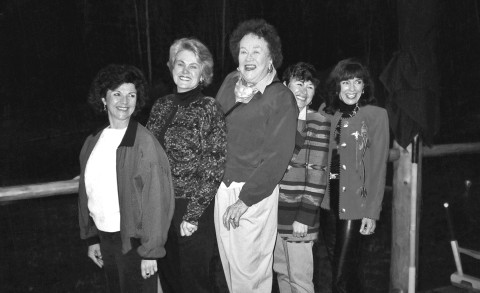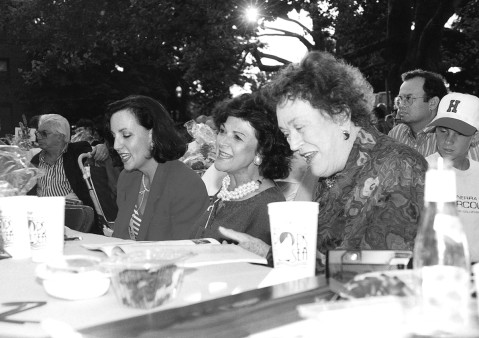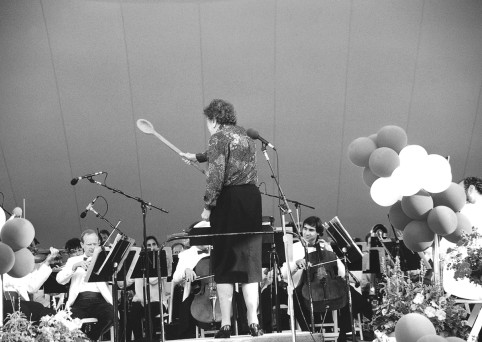Backstage with Julia (28 page)
Read Backstage with Julia Online
Authors: Nancy Verde Barr

She pulled me aside and whispered, "Dearie, will you go back downstairs and turn my books cover out?" Hatchards had several of her books, but they were positioned on the shelves with their spines facing out. Cookbook authors resolutely believe that if the cover is showing, the book is more apt to sell, so she sent me back downstairs to turn her covers out.
The official finish of Julia's book tour by no means signaled an end to her full and active schedule. In fact, somehow it seemed to become even more hectic. Fortunately, that's when Stephanie Hersh applied for a job. "I'm going to try her out," Julia told me. "I haven't promised her she can stay."
With degrees from both Katherine Gibbs and the Culinary Institute of America, Stephanie had the organizational skills to whip the chaos of Julia's schedule into shape and the culinary expertise to see and understand the whole picture of Julia's work. The "tryout" lasted for all the years to come, and "Thank God for Stephanie" became a common Julia refrain.
By spring 1990, the chaos in my personal life had dissipated, my manuscript was at the printer, and I was back in actionâJulia action, which meant we were off on new adventures, not ever getting T, and having fun again. Occasionally we were also getting lost.
In addition to the phrase
"immer etwas"
and the potato ricer, Julia had acquired a proficiency for reading maps when she and Paul explored Germany by taking long road trips.
"Paul would drive and I was the navigator," she told me during a road trip we were taking from southern Massachusetts to Cambridge. We were in her car, I was driving, and she decided to give me a demonstration of her skill. "Let's pull off the highway at the next exit and find our way on the back roads. I have a good map."
So I left the sure route and, following Julia's commands, jigged and jagged along deserted country roads. We seemed to be moving in the right direction, but then a sprawling, fenced-in facility of some sort blocked our way.
"Well, that's not supposed to be there at all," Julia said, looking back at the map. "This road should go straight through."
"How old is that map?" I asked.
"We bought it when we moved to Cambridge." That was some thirty years before! I suggested we turn around and try to find our way back to the highway, but Julia said we had to "stay the course." She scrutinized her map, directed me to turn this way and that, and we maneuvered our way around the facility. It was getting dark, and there were no streetlights and no major roads in sight. I checked the gas tank. I wondered if we had any food in the car. I thought about the newspaper headlines: "Culinary Giant Found Starved to Death with Clueless Driver." Julia's frequent comments that "this seems right" gave me no comfort, especially when what "seemed right" brought us to a halt in front of a mountain of a rock. "Must have been a meteor," Julia said. "It's not on the map either." Somehow she navigated us out of the wilderness, onto a street with lights, and, to my great relief, onto Memorial Drive in Cambridge. I have no idea how she did it, and I suspect she didn't either. I just know she loved every minute of the off-road adventure.
In 1990, we took on Colorado. The
Food & Wine
Classic is a four-day-long foodie lollapalooza that
Food
&
Wine
magazine sponsors each June in Aspen. Julia wanted to go not just for the event itself but because it was an opportunity to spend time with a favorite niece, Phila, who lives in nearby Golden, Colorado. As soon as we arrived in Aspen, Julia experienced the unpleasant, sapping effects of the high altitude. She walked more slowly and had to stop and rest often. At times she seemed to struggle for air. I was concerned, but she assured me she was fine.
Less fine were the preparations for her demonstrations. She planned to make the quick puff pastry recipe that she had done hundreds of times, and we needed several batches of the dough ready to use. But her recipe didn't work in the high altitude. The very low humidity and low air pressure had disastrous results for the dough, robbing the water we kept adding well beyond the amount the recipe called for. We were having a desperate time getting the proportions right, and several times I tried to get Julia to go to her room, assuring her that I would let her know as soon as we were close to working it out. "I'd rather stay," she said emphatically. Friends around the kitchen left their own prep stations to offer advice, and it was the elfin dynamo Barbara Tropp who saved the day. Barbara was a lovely lady who until her unfair and untimely death was the chef-owner of the truly outstanding China Moon restaurant in San Francisco. In Aspen, she introduced us to the secrets of pastry making in the mountains. We needed to add more of the high-protein all-purpose flour and less of the softer cake flour and increase the water by so many tablespoons per thousand feet of altitude in order to offset the high rate of evaporation.
We got it right, but the multiple testings and then making all the dough we needed for the demonstration took a long time, and the altitude took its toll on Julia. With several neatly wrapped packages of perfect puff pastry tucked into the refrigerator and clearly marked with Julia's name, we returned to the hotel. I thought it was enough of a day for her and suggested that perhaps she should rest that evening instead of attending any of the planned events. I should have known better; I did but I forgot. Julia refused to stay put, and after a quick change of clothes we headed out for a dinner that lasted well past midnight.

The next day she was ready to play with her friends. Cookbook author Pat Wells arrived in Aspen with a new trick: "the stance." In France she'd learned from some model types that if you stand with one shoulder to the camera, extend your arms slightly forward, and turn only your head toward the camera, you miraculously look pounds thinner. We thought this was the best thing since American foie gras, and like silly schoolgirls we would chant "the stance, the stance" whenever someone asked to take a picture. It may not have made us look any thinner, but it sure did make us smile broadly.
That summer we also found ourselves playing outside the food world. The Boston Pops invited Julia to conduct a musical piece during its annual concert at its Cape Cod esplanade. It was not Julia's first concert performanceâin the 1960s she'd done an incomparable reading of
Tubby the Tuba
at Boston Symphony Hall with Arthur Fiedler. Julia invited Susy Davidson and me to go along with her for the Pops weekend, and we arrived in Hyannis the night before the concert, dined out with Charlie Gibson and his wife, who have a summer home on the Cape, and said goodnight with promises to resume eating at breakfast.
"Knock me up at eight," Julia said, using her favorite expression for a wake-up call. She knew it was slang for getting pregnant and thought it was a hoot to use it as she did.
As promised, Susy and I stood knocking on her door at eight the next morning. There was no answer.
"Maybe she's still sleeping," Susy offered, but I raised my eyebrows at her and we dismissed it as an improbable explanation.
"Although she could be in the shower," I suggested. "There are phones in the rooms' bathrooms. Let's call her from the lobby."
The phone rang and rang, and after checking the dining room to see if she was already breakfasting, we began to worry.
"Wait!" I said, remembering. "I have a key to her room." We let ourselves in, quietly announcing our arrival lest hell had frozen over and she was still sleeping. She was sitting at her desk with a set of headphones securely on her head and the cord attached to a Sony Walkman. She was waving a pencil in the air with a great deal of liveliness.
"Good morning," she said when we moved into her line of vision. She slid the headphones from her ears to her neck. "I'm practicing. It's a demanding piece." During the performance, John Williams was to call her up onstage, where he would pass her his baton and she would conduct the orchestra in "The Stars and Stripes Forever.
"
"Lots of booming," she said. "I want to make sure I'm ready for them."
"How are you doing with it?" we asked.
"I think I need a lot more practice," she said. "I'm going to stay here for the morning." She returned to the Sony and her pencil and spent hours practicing her upbeats, downbeats, and flourishes.

On a beautiful, clear summer evening, Susy, Julia, and I sat in the audience singing along with the music when asked to. Just as planned, partway through the show, John Williams called her to the stage and passed her his batonâor tried to. When he held it out to her, she waved her hand and shook her head. Before I could even think that she was chickening out, she walked over to the horn section, where an obvious conspirator reached down and pulled something from under a coat on the stage floor. It was a four-foot-long wooden spoon, and Julia accepted it with exaggerated conductor's pomp before returning to a delighted John Williams. With every note perfectly beat by the spoon's vigorous waving, she conducted "The Stars and Stripes Forever," accented by her piece of orchestrated hamming.

It's lovely never to lose the delight of surprising people, and Julia didn't. She got me, yet again, during a demonstration at which she made a cake that called for six beaten egg whites. When we were setting up for the show, she asked for both a K5A stand mixer and a copper bowl for the whites.
"Which one are you going to use?" I asked.
"I haven't decided," she said, so I had both ready.
When it came time to beat the whites, she explained to the audience the difference between beating egg whites in the copper bowl and doing it in the mixer.
"Let's see which is faster, shall we?" she said to the audience. For a moment I thought she would start the K5A and then begin whisking by hand, but she turned to me. "Nancy, you use the bowl, and I'll use the machine."
